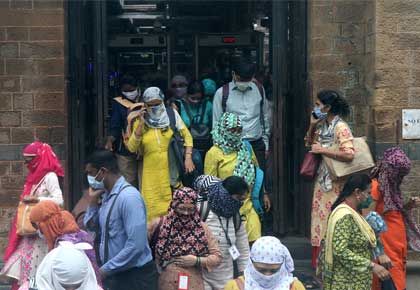'Vigilance is the enemy of the virus.'
We need to be alert all the time, about this, until we fully understand it.
'And that's going to take years, actually.'
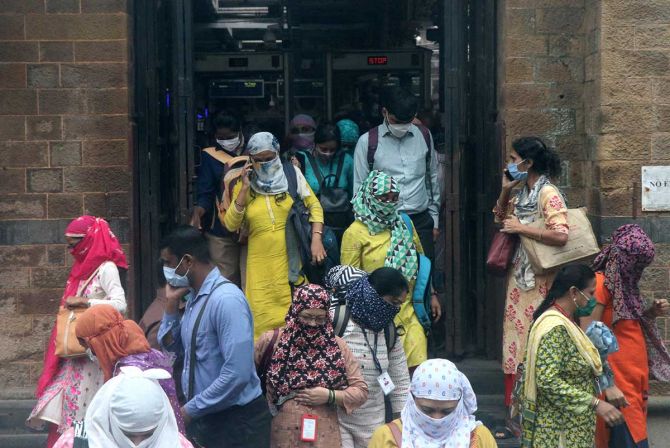
When you have soldiered through COVID-19, suffered it and come out alive -- luckily -- with just a few irritating, lingering symptoms, guaranteed your life WILL change.
COVID-19 WILL change your life.
It will change your life -- all of our lives -- even if we don't get sick with it.
For a long, long time.
That's what Professor Jeremy Nicholson discovered.
He's a pro-vice chancellor of the health sciences at Murdoch University in Perth, Western Australia, he's a professor emeritus at Imperial College, London, he's the head of the Australian National Phenome Centre and he's a COVID-19 survivor.
In Part 2 of his interview to Vaihayasi Pande Daniel/Rediff.com, Professor Nicholson -- who is working on apredictive metabolic model for COVID-19, a disease which has multiple body effects -- talks about what is normalcy in a post-COVID-19 world.
Or even if there is such a thing called normalcy ahead of us.
Will the COVID-19 World War ever be over?
It is now sort of difficult to distinguish or say whether somebody has recovered from COVID-19 or not.
You can say that the virus has gone.
But you can't necessarily say they have recovered, because they've gotten damaged from being ill with the disease. Correct?
And there's a lot of focus at the moment on COVID-19 relapses and immunity.
Does it seem one can have a relapse of the actual illness?
Do you feel that you have immunity?
'You have recovered' is how people describe when you have recovered from the COVID-19 lung symptoms.
You cannot describe people, who have got the disease, and got diabetes etc, as recovered, because they have still got it.
So, the whole what-is-recovered issue needs to be questioned.
If you look at it from the long-term point of view, it's much more complex.
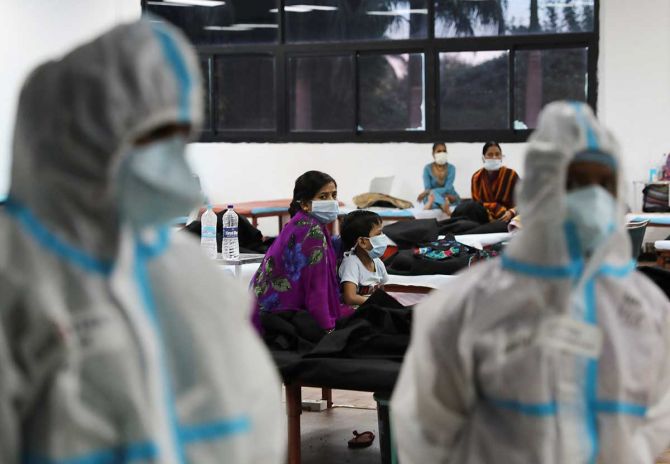
Then that that sort of makes it closer to something like HIV, which is more long lasting?
We are talking about different things here.
The virus SARS-COV-2 can go away and probably does.
But it the leaves behind -- not in everybody, but in some people -- it leaves behind damaged organ systems.
We don't know how long that lasts, right?
In the case of HIV, the virus does not go away.
It continues to have effects.
You can control those with drugs very well now.
In the case of herpes virus, it does not go away. They never go away.
Even if an episode of herpes passes, the virus is still there.
It actually lives within the nerve cells, and then it pops out sometimes, frequently, and sometimes very infrequently. But it never goes away.
In the case of COVID-19, we think the virus does go away.
But no one is absolutely sure about this.
Certainly, the viral count in the lungs goes down very, very markedly.
But we do not know whether it can hide in the body, like for instance, HIV or herpes viruses.
It probably doesn't, because it's a coronavirus.
But nobody really knows.
The thing about the virus is -- I like to describe it as being like Pandora's box.
All the evils of the world jump out when you open it.
Every time we look at look at it -- and we're working every day on this subject, not quite every day but nearly every day -- we discover a new and nasty thing about it.
That's what's really different about this disease.
It has so many different effects.
How those different effects occur in different people and why one person shows lung damage and another kidney damage -- we just don't know that yet. We simply don't know.
It is very, very different to anything we've ever seen before.
It's also incredibly infectious.
It is probably 10 times more infectious than influenza.
And COVID-19's also much more dangerous.
It's like 50 times worse than influenza, if you can imagine what that actually means.
A virus likes complacency.
It likes people to think: 'I have had it (COVID-19) now. I don't have to worry about it anymore'.
Vigilance is the enemy of the virus.
We need to be alert all the time, about this, until we fully understand it.
And that's going to take years, actually.
It is going to change the world.
It's changed it already
So, you don't think you personally are immune to COVID-19, after having suffered it?
Not necessarily immune.
I don't know if I am immune or not.
I know my antibody levels have gone very, very low.
Antibodies, to detect them, you need reasonably high levels.
To be immune you can still have quite low levels.
But nobody knows the answer to that question.
It is like everything else.
Some people will become immune and there will be a little bit of immunity which will be retained for some time.
Other people will not be immune.
We simply don't know yet.
Most of the real answers to questions about COVID-19 are: We don't know.
We will know over the next month or year a lot more about it.
There is a little excitement every day.
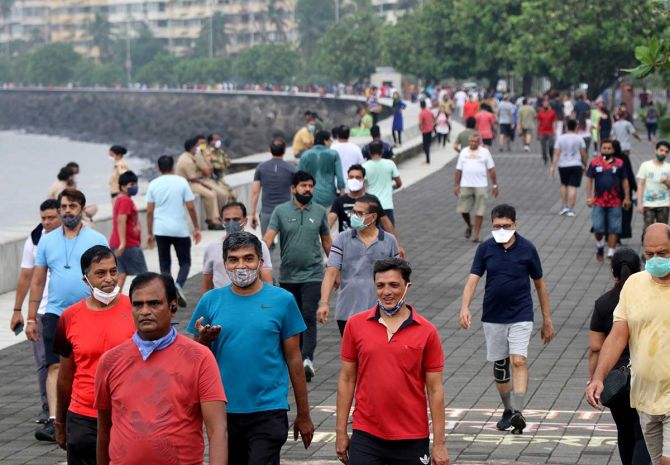
You said COVID-19 is going to change the world.
When you are very close to the information and facts of the disease and you are working on it every day, like I am, for instance, you know its dangers and are hesitant to normalise your life.
Then when you suddenly look at photographs of people bringing their lives back to normal it is a bit stunning.
Like if you look at a picture of 2,000 people jumping into a swimming pool in America you think they are crazy.
Do you feel that is crazy too?
From your point of view, what are the things that you are hesitant to do again?
It simply is crazy.
It hasn't been communicated to the public enough about how dangerous this disease is.
I think people know it is pretty infectious.
But people are very strange.
They think it is not going to happen to them.
They know that some people are hardly affected at all by COVID-19 and they think: 'Oh, that will be me. If I do get it, I will be fine'.
That's how they look at it.
I think if they really knew that they could be getting diabetes, without knowing it, that might change their minds about this.
But that information we're publishing just now.
And there are others publishing it as well. We're not alone.
If people become more aware of how harmful about it...
It happened in Singapore and it's happening in Australia that the second wave is often bigger than the first one.
Singapore had almost no cases in early April.
But within two weeks they had 18,000 from having a hundred or so earlier.
The same thing happened here in Australia.
We went from very low levels in early June to a level that was four times higher than the previous level in the first place, all in a few weeks' time.
It only requires one person, or a small group of people, who go it, to be wandering around, not knowing they are spreading it, for it to break out again.
The problem is really that it's now everywhere on the planet.
I mean, every country in the world probably, except for the Antarctica.
It's still difficult to detect even if you have got the right kit.
Most swab tests give you 30 per cent false negatives.
The antibody tests are too slow and cumbersome.
And you just cannot test 8 billion people on the planet.
So, it's going to be like influenza in one way -- COVID-19 is always going to be with us.
It is always going to be much more dangerous than influenza.
It's like influenza on a turbocharger.
It's influenza plus all the other things it can do to the body.
Until there's a vaccine -- I'm still skeptical about that as well - I think it is more likely it is going to be like influenza or HIV.
There is no HIV vaccine but we can control it with drugs.
I think that is a more likely the long-term outcome for COVID-19 for people in most countries.
There will be repurposing of antiviral drugs or creation of new drugs.
But all of that it's going to take a long time.
So we're in this for years. Really, we are in this for years.
There's always stuff about herd immunity.
But 70 to 80 per cent of the population has to catch it to get herd immunity and it causes long-term disastrous effects like liver damage and diabetes.
The concept that it might have long-term impact totally destroys the idea of herd immunity.
It becomes nonsense, because everybody in the population becomes a long-term sick.
And the economic costs of that. Astronomical.

What are the some of the things you refuse to do now to normalise your life?
Will you get on a plane?
I have no choice in that.
You cannot fly out of Australia, period, without having a letter personally signed by a cabinet minister and you better have a damn good reason for going on international business!
Nobody's leaving the country.
Very few people are coming in.
So that option is not available.
I'm in Western Australia (state), where there are, I think, currently no patients whatsoever.
Or maybe one or two people, who are recovering.
There are no infections today.
There is no transmission here.
Shops are all open. People are all going to work. Bars and restaurants are completely open.
But the borders are totally shut.
You cannot even go from one state to another. I haven't gone out of state.
That works very well.
But it won't work forever.
Because people will get through and also economically it's a disaster.
Somehow, we have to find a way of opening the states and the country in a safe way.
And what is happening in say Portugal and the UK is completely crazy.
Guaranteed it will never go away.
It's probably too late now to try to get rid of it.
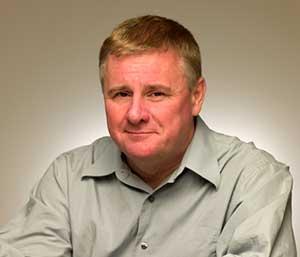 IMAGE: Professor Jeremy K Nicholson, pro-vice chancellor of health sciences at Murdoch University, Perth, western Australia.
IMAGE: Professor Jeremy K Nicholson, pro-vice chancellor of health sciences at Murdoch University, Perth, western Australia.What is your philosophical point of view?
When you mull over it, what is your philosophical take on the COVID-19 situation, because it's like a life-changing phenomenon?
As Donald Trump says: 'It is what it is'. I don't mean it the same way as he, alright (laughs)!
I was traveling at the time when the virus was in north Italy.
I was in southern Italy and there were supposedly no cases there.
I was there for only two days or three days.
There was nobody really around me.
I was starting to work on COVID-19 as early as February.
But I still wasn't thinking about the chance of getting it.
It is what it is.
In that respect, what is important is, that I know I have the metabolic effects of COVID-19 and possibly long-term metabolic effects.
So, I have changed my lifestyle now and I am managing my lifestyle given the potential problems I might have.
That said, I don't feel physically unwell at the moment.
But my blood sugar is through the roof.
It will have changed my long-term disease risk.
The promise of freedom is eternal vigilance.
That's how we have to look at this disease.
Vigilant all the time
Careful all the time.
Disinfect all the time.
Avoid crowded places, where the virus is active, all the time.
Feature Presentation: Ashish Narsale/Rediff.com
